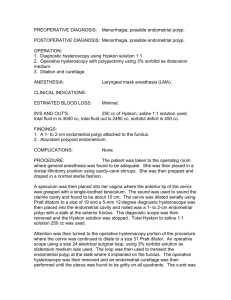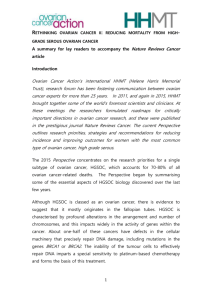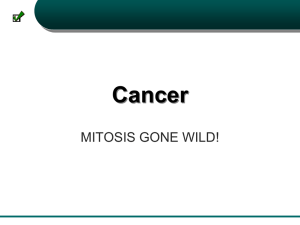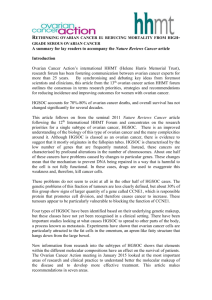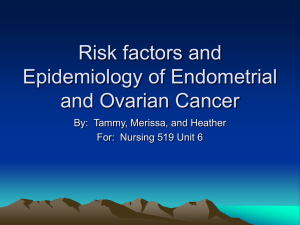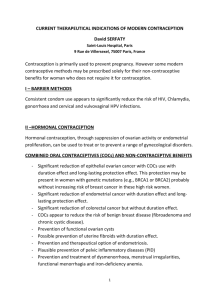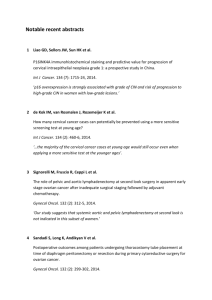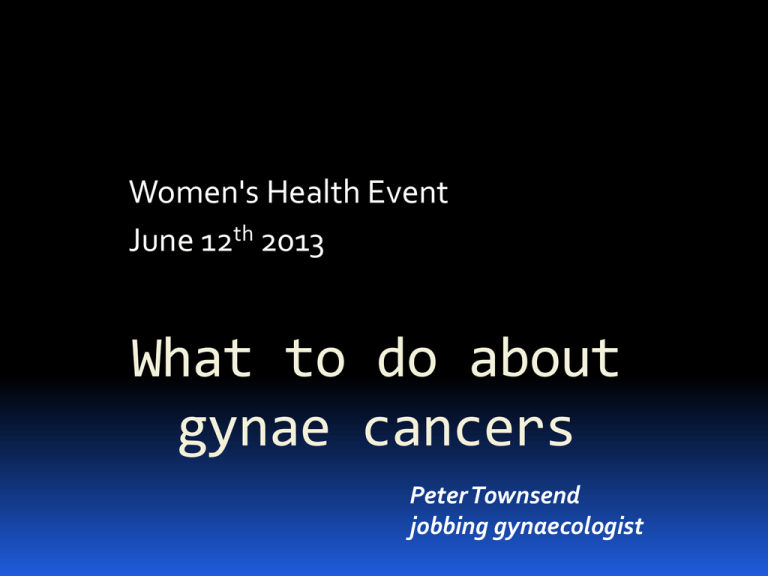
Women's Health Event
June 12th 2013
What to do about
gynae cancers
Peter Townsend
jobbing gynaecologist
Here’s a pretty big lump
What shall we do with this one?
But not all big lumps are Cancer
Even when they
look pretty nasty
But, of course, some are
Even when the look
pretty innocent
And they always are when they
look like this
It’s best of all if they
can be avoided
So all women should
Stay slender and not get diabetes
Stay celibate
But most don’t so have an HPV vaccine and take the
COC pill between having 3 babies
Or if a bit too old for that at least have regular smears
Maybe do away with the “at risk bits”
And it’s always good to not smoke (or is it?)
Maybe drink coffee
Be affluent and
Consider dying young of something quick and easy
Second best, find it early
5 Year Survival Rates, Stage 1
Stage 1a Cervix Cancer
96% at least
Stage 1b Cervix Cancer
90%
Stage 1 Endometrial Cancer
85%
Stage 1 Ovarian Cancer
92%
Stage 1 Vulval Cancer
90%
So pretty good if we can find
it when it looks like this
Stage 1 Endometrial Cancer
But if we don’t the outlook
is not so good
5 Year Survival Rates, Stage 4
Stage 4 Cervix Cancer
15%
Stage 4 Endometrial Cancer
25%
Stage 4 Ovarian Cancer
6%
Stage 4 Vulval & Vaginal Cancer
30%
For example
This ovary
With its omentum
and peritoneum affected
If only we could find them all at
an early stage and for them all
to be low grade
But life’s not quiet as
simple as that
So how about screening?
(Just to get it out of the way with one slide)
Cervix
Works well, prevents some and
detects some at very early stage
Ovarian
Would be very nice but it doesn’t
work. Limited place
Endometrial
Not practical but incidental pick up
and some high risk exceptions
Vulva and vagina
Only for high risk few
So, when they do come to our attention
What do we actually do about them
& are we getting any better at it?
Endometrial Cancers
Most seen in Fast Track Clinic
TVS, endometrial thickness
Pipelle
Or Hysteroscopy
MRI, CXR, CA125
CT CAP if high grade
Hysterectomy and BSO usually
Lap/vaginal
Occasionally radical surgery
Sometimes Brachy/radiotherapy
Occasionally chemotherapy
Are we getting any better
at treating it?
100
90
Endometrial Cancers,5 year survival rates
80
70
60
50
40
30
20
10
0
1975
1980
1985
1990
1995
2000
2005
It looks even better if you
use financial media tricks
92
90
Endometrial Cancers,5 year survival rates
88
86
84
82
80
78
76
74
72
1975
1980
1985
1990
1995
2000
2005
Ovarian Cancer
The one that they all worry about
Most do not come via our Fast Track Clinic
Try to get them before anyone else does
Or failing that “reclaim “ them
Try to decide whether its cancer
Ultrasound scan
Blood tests
CT chest abdomen & pelvis
MRI occasionally
MDT discussion
Mostly Radical surgery and chemotherapy but individual plans
for each patient
Occasionally palliative care from the start
Sometimes too late to do anything much at all
Things have improved here a bit too
Is it the surgery, the chemotherapy or something
else that has helped with the results?
100
90
80
70
Ovarian Cancers ,5 year survival rates
60
50
40
30
20
10
0
1975
1980
1985
1990
1995
2000
2005
Cervix cancer
Some via colposcopy, some FTC others A&E
Investigations and treatment varies greatly
depending mostly on stage, MDT approach
May already have been treated adequately by
LLETZ in colposcopy clinic
EUA, biopsy, cystoscopy, sigmoidoscopy
MRI pelvis
CT/PET Chest Abdomen & Pelvis
Radical surgery, sometimes staged,
often laparoscopic
Or Chemo-Radiation
Occasionally both, neither or less
We are getting better at
this one too
and it’s becoming rarer
100
90
80
70
60
50
40
30
20
10
0
Cervix cancer
1975
1980
1985
5 yr Survival
1990
1995
Incidence
2000
2005
Vulva and Vagina
Most seen in FTC, a few in A&E
Some are easy to spot
Biopsy and histology
CT CAP
Vulva mostly surgery, individually
planned, with or without
lymphadenectomy
Vagina mostly Chemotherapy
plus Radiotherapy
Others are a bit
less obvious
We don’t see many but we are
getting steadily better
and should soon do better on morbidity
100
90
80
70
Vulval & Vaginal Cancers , 5 year survival rates
60
50
40
30
20
10
0
1975
1980
1985
1990
1995
2000
But it’s not all about
statistics and big egos
(although there are plenty of both)
It’s more about....
Treating patients as individual people, not diagnoses
Listening to what they say, ask and want
Being honest and realistic
Gaining trust
Working as a team, getting help from wherever we can
Realising that we are each only bit part players in their
cancer journeys
Keeping cheery
Now,
I was told that there
would be 15 minutes for
Questions and Answers
So, here is a little quiz
Questions and Answers where I ask you the
Questions and you tell me the Answers
An interesting and unusual
case
For you to help me to sort out please
Or to tell me what to do
Politely
Here is the story
Miss ST
Aged 15 years
Discomfort in her lower abdomen two
weeks ago and noticed a lump
Some loss of bladder sensation
What else
shall we ask
her?
What else shall we ask her?
Q Any other symptoms?
Q LMP?
Q Other aspects of puberty?
Q Had sex yet?
A No, but lump seems too have
grown quickly
A Not yet had one, but my
younger sister has
A Some breast development
and sparse pubic hair growth
A No
What does she look
like?
What does she look like?
Q Is she abnormally short, tall, fat or thin?
A No
Q Does she look normal?
A Yes
What do we find on
examination?
What do we find on
examination?
No Ascites
No lymphadenopathy
No hepatomegaly
Just a large, smooth,
firm, mobile mass
What Tests
shall we do?
What tests shall we do?
A
Abdominal ultrasound scan
Report:
Centrally within the pelvis there is a 12cm
complex mass, with increased vascularity
Not typical of a “dermoid”
Normal uterus
No free fluid
And the Blood tests,
tumour markers & hormones
CA125
46
CEA
<1
CA19-9
5
βhCG 112
AFP
1
LDH
2200
LH
21
FSH
77
TSH
2.47
Prolactin
316
• Estradiol
212
• Testosterone 0.5
So what’s the
diagnosis?
So what’s the diagnosis?
Well yes of course we don’t know for sure…
But we can have an educated guess
An ovarian mass…
Well yes of course, but what sort?
A germ-cell tumour…..
Well yes of course, but what sort?
A dysgerminoma….(or is it disgerminoma?)
Well yes of course, but why? And what else?
Not telling yet, all will be revealed later
Life’s not always as simple as that
Germ-Cell Tumours
Classification
Benign
Mature cystic teratomas
aka dermoid cysts
…………..…………
Malignant tumours arising
from components of a
Dermoid
Just about anything but
SCC commonest & most >40y
Malignant germ cell tumours
Mostly young, peak early 20s
Dysgerminoma ( ≡ Seminoma)
Yolk sac (endodermal sinus) tumour
Embryonal carcinoma
Polyembrioma
Non-gestational choriocarcinoma
Immature teratomas
Mixed primitive germ cell tumours
Malignant germ-cell tumours
Clues from tumour markers
Histology
AFP
Dysgerminoma
Yolk sac tumour
+
Embryonal carcinoma +/Polyembryoma
+/Choriocarcinoma
Immature teratoma
+/Mixed germ-cell
+/-
hCG
+/+
+
+
+/-
LDH
+
Clue
D
Think Pregnancy
Think Placenta
So we’ve made the diagnosis.
What shall we do next?
What shall we do next?
CT scan of chest, abdomen and pelvis:
Result: Largely solid ovarian mass
No ascites or pleural effusion
No lymphadenopathy
No lung or liver metastases
What shall we do next?
CT scan of chest, abdomen and pelvis:
Result: Largely solid ovarian mass
No ascites or pleural effusion
No lymphadenopathy
No lung or liver metastases
Then What?
Then What?
A long chat with patient and parents
Explain most likely diagnosis and treatment
Plan fertility sparing surgery, ASAP
What did I find at
laparotomy?
What did I Find?
Her right ovary, fallopian tube
and uterus
So we took out the right ovary
& tube,
and it looked like this
But this is what the
left side looked like?
So what do we do
now?
So what do we do now?
Have a cup of tea while waiting for the frozen section.
Answer dysgerminoma so…
Omentectomy pelvic and para-aortic node sampling
Send blood for karyotype
Monitor her tumour markers
Phone Michael Seckl or Philip Savage at Charing Cross Hospital
What happened to her
tumour markers?
Pre op
βhCG
LDH
CA125
112
2200
46
D2 post op
5.9
816
34
D14 post op
5.0 ↑
normal
normal
What else happened?
Karyotype result:
46XY in 280 of 280 cells
Swyer’s Syndrome (46XY gonadal dysgenesis)
CT scan 3weeks post op
Small volume pulmonary metastases
4weeks post op. starts chemotherapy with Bleomycin, Etoposide &
Cisplatin (BEP)
19 weeks post op. laparoscopic “LSO”
26 weeks post op. sits GCSEs
Now well and at University studying politics
Swyer’s Syndrome,
Complete 46,XY Gonadal Dysgenesis
Several causes, usually a new mutation on X or Y
chromosome, if Y usually the SRY region. Some
mosaicism
Failure of gonad to progress beyond the
indifferent stage, so it makes no testosterone
Embryo develops to the default position
Healthy girl, normal stature, delayed puberty
Elevated FSH & LH, low E2
USS, small uterus & can’t find the ovaries (unless
there is a big one)
Other things to talk about
Hormone replacement
estrogen & progestogen +/- testosterone
Sexual / body image considerations
Genetic counselling, DNA tests
Having babies
Other things to talk about
Hormone replacement
estrogen & progestogen +/- testosterone
Sexual / body image considerations
Genetic counselling, DNA tests
Having babies
We probably shall not get
here unless we overrun
Thanks



